If you run a hotel, then you want people to visit and stay the night. Actually, you’d prefer them to stay more than one night in most cases. However, to get people to stay at your hotel, you can’t let your hotel’s blog stay put itself. Your website needs updated content on a regular basis.
Routine hotel blog posts serve you well for two reasons. First, they keep various clients and readers coming back for more. Second, you keep Google happy, since the world’s biggest search engine favors rankings for websites that keep getting updated with new content.
Three Fundamentals for Hotel Blog Posts
While there are particular keywords and content ideas specific to hospitality blog sites, the best hospitality blogs first make sure they adhere to the basic fundamentals that apply to all blogs. Consider these three briefly anytime you sit down to update your own blog.
1) Keep Your Audience in Mind
Never write for yourself. Write for your hotel guests and potential guests. Think about what they would like to read. It’s super easy to get caught up in something you care about, and sometimes pure personal passion makes for authentic and engaging content. However, if all you’re thinking about is how much money you might make off of drawing people in, then you’re not remembering them for what they truly are right now, which is simply readers.
2) Effective Intros Always Matter
Your introductory paragraph might be the most important one in any blog post. It’s your best chance to snag what little attention they give you and keep them on your website absorbing more content. Answer a question. Entertain them. Inform them. You have the rest of the paragraphs to go into details, but only if they know what they’re reading and why it matters early on.
3) Proofreading Is Like Housekeeping
Does your hotel give clients rooms that haven’t been cleaned up? Of course not. Do the same for all your hospitality blogs. Prospects that see typos on your professional website are likely to subconsciously assume your hotel’s room service and housekeepers are just as careless, even if there’s not an actual association.
Improve your content marketing + SEO in 60 seconds!
Diib uses the power of big data to help you quickly and easily increase your traffic and rankings. We’ll even let you know if you already deserve to rank higher for certain keywords.
- Easy-to-use automated SEO tool
- Get new content ideas and review existing content
- Checks for content localization
- SEO optimized content
- Built-in benchmarking and competitor analysis
- Over 500,000k global members
Used by over 500k companies and organizations:
Syncs with 
Why Do Hospitality Blog Sites Matter?
If your hotel is already doing search engine optimization and participating in social media across many platforms, you might be wondering why blogging even matters. The simple truth is that while SEO and social media outreach can generate website traffic and leads, hospitality blogs UK readers follow wind up also generating leads but for only 40 percent of the cost. You shouldn’t abandon your outbound marketing methods, especially given the synergy they can have with hospitality blogs, but digital inbound marketing that happens with an effective blog gives you leads and room reservations for nearly one-third the costs of other methods.
Most of the market already knows this. That’s why nearly every hotel you look at is already running its own blog. Around the world, people are writing 2 million different blog posts, and that’s on a daily basis.
Hospitality blog sites have their own corner to all this, sure, but there is still competition. That competition isn’t just with each other though. Even the best hospitality blogs have to complete with travel blogs, food blogs, and many other industries or niches that aren’t too far from the hospitality sector. You can’t just write regularly. Your content has to grab attention and justify that attention by delivering high-caliber and useful content.
Long posts are a great way to go. Not only do they rank higher on search engines, but they even generate more backlinks. Moz found out that there is a direct proportion between content length and how many backlinks you get. The more, the better.
FACTS: In the marketing industry, the top-performing articles are over 5,700 words in length. In fact, articles that are over 3,000 words get 3x more traffic, 4x more shares, and 3.5x more backlinks than shorter articles. (Hubspot)
Hospitality Blogs UK Readers Respond To
Getting a great response to your content isn’t hit or miss, nor does it involve lucky guesses or throwing random darts at a wall. Certain facets of hospitality blogging are known to bring in more readers than others, so try these things for every post you make, regardless of the subject matter du jour.
Use Analytics: Create profiles of your best guests. What do they buy? What needs and requirements do they have? What are their interests? If you’re not sure where to start, do an online survey. Limit it to the best guests you already get and would love to see more of. Once you have any insights, start writing copy that will specifically appeal to similar clients. Here is an example of a guest analytics blog:
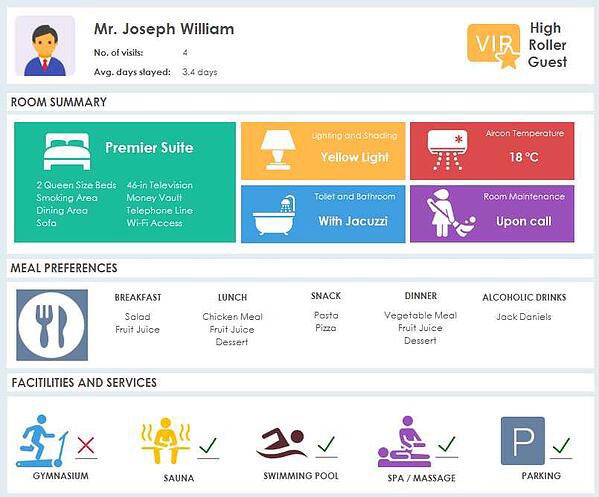
(Image Credit: Ducen Blog)
Start Off With Numbers: Blogging involves a lot of words, and words are made up using letters. However, blog posts that start with a number are more likely to get shared. According to Conductor, listicle posts are a lot more popular than regular content. They’re easier to read and even kind of fun for anyone who loves a countdown of sorts. Research has even identified specific numbers that get shared more than others. Articles with the number 10 anywhere in their headline come out on top, averaging more than 10,000 social media shares. The numbers 16, 23, and 24 also rank really well too.
You Might Also Like
Go Negative: You probably want your blogging to be a very positive stream of content so your hotel looks good. Then again, negative superlatives generate 50 percent more clicks compared to content that doesn’t have superlatives. They also get nearly 70 percent more clicks when compared to content with positive superlatives. If you’re curious what negative superlatives even are, think about titles like ‘5 Signs of A Bad Hotel’ or ’10 Ways to Waste Money on Your Next Hotel’. Content like this always makes readers wonder if they’re the ones making mistakes or which specific mistakes they’re doing and should fix.
The Headline Analyzer Is Your Friend: You can actually get a good idea of how shareable a headline is before you even write or post the content. The Headline Analyzer gives you a score, and the higher it is, the more likely you are to see your blog post start getting spread around. Use this handy tool to test out and then modify headlines until you get something you like. For instance:
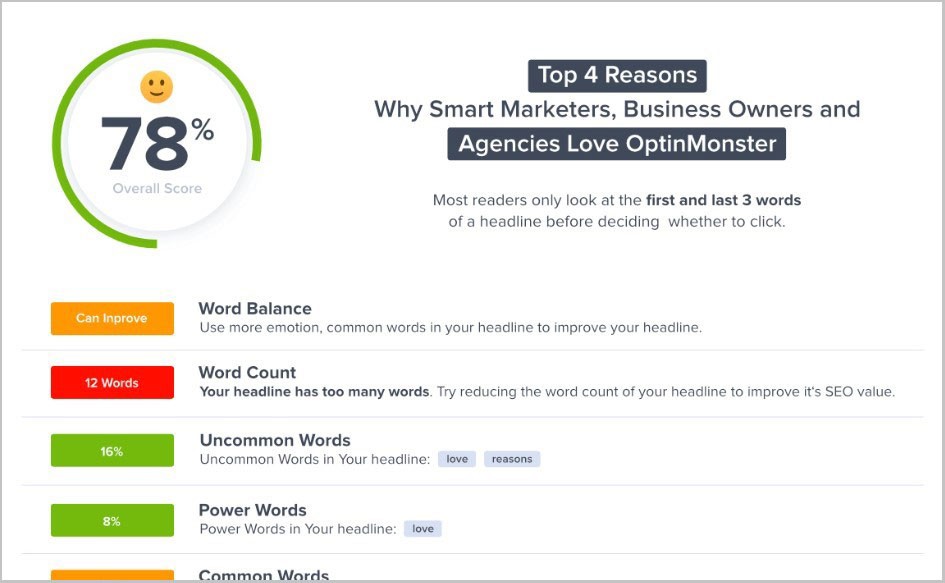
(Image Credit: OptinMonster)
How to Handle Keywords
You always need to write for your audience and come up with titles that grab attention. However, you always have to write for a second audience, too. That second audience isn’t even human, because it’s search engines. This is where keywords come in.
Keywords in Your Title: No matter how many times you rewrite your headline or check its score, you have to put the main keyword in it. Whether it’s short or long, your specific keyword has to be the primary focus of the title.
Long or Short? Short-tail keywords are more likely to generate traffic volume to your hotel website. Then again, the conversion rate that comes with them is lower. Alternatively, long-tail keywords produce less traffic, but they also help you stand out from other properties that don’t share the same attributes. Both have SEO benefits though.
Trendy Keywords: If you’re up to the pace involved, trying Newsjacking might be for you. Keep an eye out for trending topics and the hot keywords of the day. If you can update your blog fast enough and get information up about a recent event or breaking topic before many others, then your page might enjoy some brief attention in Google’s News section. Just beware that such results don’t last long, given the nature of this tactic.
Finding Trending Keywords: Facebook Trends, Twitter Moments, and Google Trends are three good places to look for things people are searching for right now and very recently. Just make sure you get content up fast, as these are subject to change very quickly all the time. The image below shows what google trends looks like:
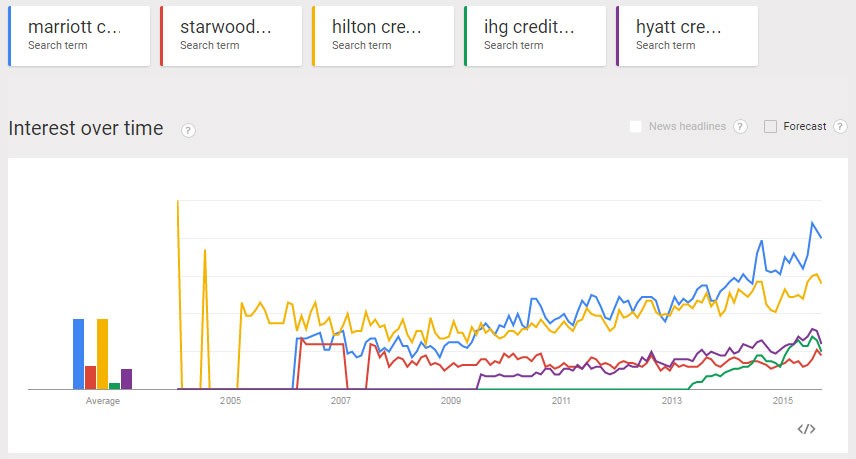
(Image Credit: Saverocity)
Keywords Ranking Already: If your hotel blog has already been up and running for a while, then you are probably already ranking for some keywords and getting traffic for them. Use Google Analytics to find such keywords so you can expand on them and get more success.
Inside Google Analytics: When you’re in Google Analytics, use the analytics dashboard to find search queries that generated organic traffic. In particular, keep an eye out for the following:
- Keywords related to the services and amenities of your hotel that you don’t yet have content for.
- Keywords related to some of your content but where you could post more.
- Keywords similar to current content that you haven’t focused on yet.
Any content you create in these three categories will rank, but your current content can enjoy a boost from your new efforts too.
Local Keywords: A lot of people planning on travel look up their destination cities and areas as much as hotels, so make sure you show up in those searches. You might even want to write content that involves other hotels in your market. For instance, if you write a blog post about “10 Great Hotels in London”, then you’re going to do well for a high-performance keyword like “hotels in London”.
We hope that you found this article useful.
If you want to know more interesting about your site health, get personal recommendations and alerts, scan your website by Diib. It only takes 60 seconds.
12 Ideas for Content
You can never be content with your content. While you should understand by now the importance of keeping it coming, actually doing so is another story. The following are 12 content ideas you can use to keep the blog rolling.
1) Let Facebook Work for You:
You want your blog content to get shared on social media, but sometimes, your blog should actually take a backseat to your social media. Facebook rewards businesses that create videos by showing them in feeds more often than purely text content. Why not do a Facebook Live video where you let people tour your hotel’s special features and unique character? Don’t just do a press release from the front doors or desk. Walk them through your property’s garden, or do a paranormal investigation of an attic supposedly haunted. After your broadcast, the video stays on Facebook, but you can embed it into your blog and build more content around it, particularly anything followers find fascinating.
FACT: 43% of survey respondents say that branded video is the most memorable type of content shared by companies. (Hubspot)
2) Does Your Hotel Allow Furry Friends?
If your establishment is pet-friendly, let everyone know. Take it a step further, though, and help pet owners see your hotel and area through the eyes of cats and dogs. What are the rooms like for them? Do you have pet shampoo and extra leashes at the front desk? What emergency vet do you recommend? Where are local dog parks? What are local pet laws like? Where can the whole family go and bring the dog and cat along? For example:
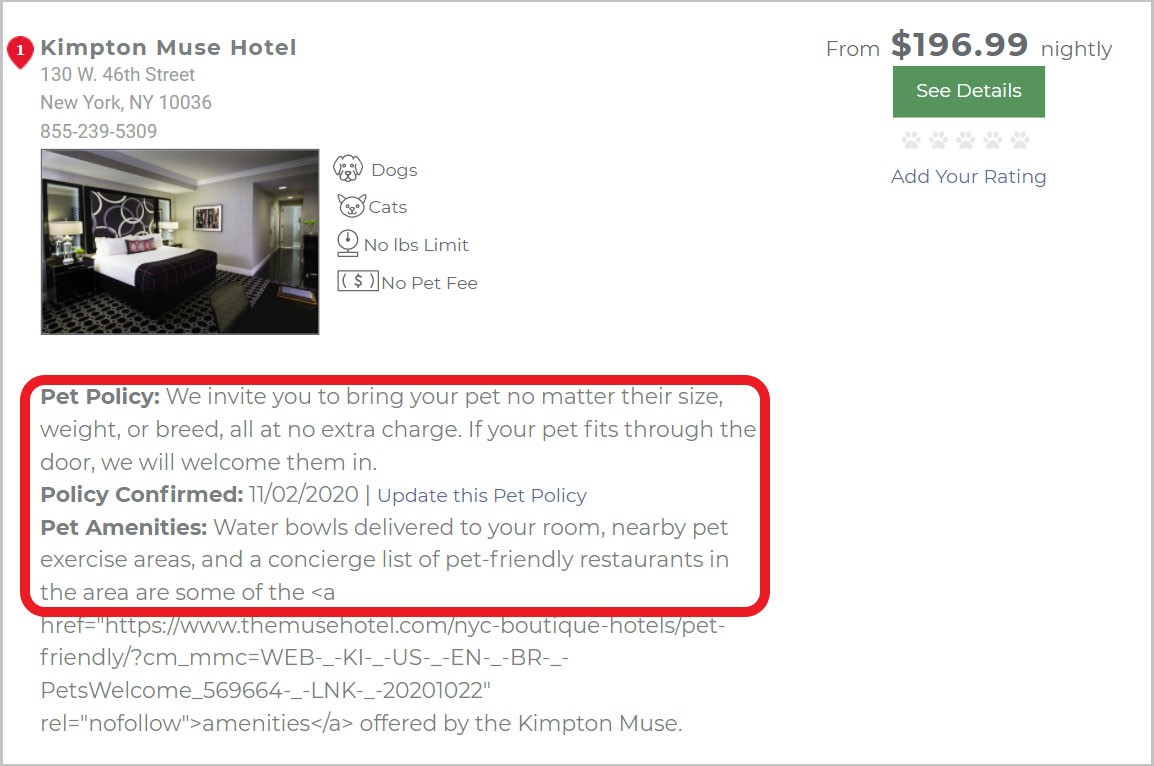
3) Share Your Values:
Even hotels can have personality. You and your staff might also have strong values you believe in. Does your hotel emphasize recycling, solar panels or local food that isn’t transported long distances burning fossil fuels along the way? Say so, and connect with others that care about the environment.
4) Open the Doors to Vacation Bragging:
Instagram is one of the most successful social media platforms on the planet, and yet most of it revolves around people bragging about their vacations. It happens on Facebook a lot, too. Find out which of your guests are having a blast at your hotel, and then ask their permission to share their photos in your blog. Most will say yes, because what better way to brag about your family on Christmas letters and cards than pointing out how your smiling kids made the hotel blog? Your blog will seem more authentic, and you’ll pick up more followers among their friends and family that are more inspired than jealous.
5) Emphasize the Off-Season:
Whatever your off-season time of year is, that’s when you want more bookings. Lower prices and smaller crowds are certainly appealing points to many, but what can they do in your area or city when it’s not high season for tourists and vacationers? This is one idea where listicles can really hit home.
6) Talk to Parents:
Family vacations can be cherished memories or disasters they regret for decades. Help parents out by letting them know what kids can do at your hotel and in your area. This is where negative superlatives can really help out. Don’t write about “12 Things Kids Can Do in Liverpool”. Write about “Six Ways to Prevent Temper Tantrums When in Liverpool”. For example:
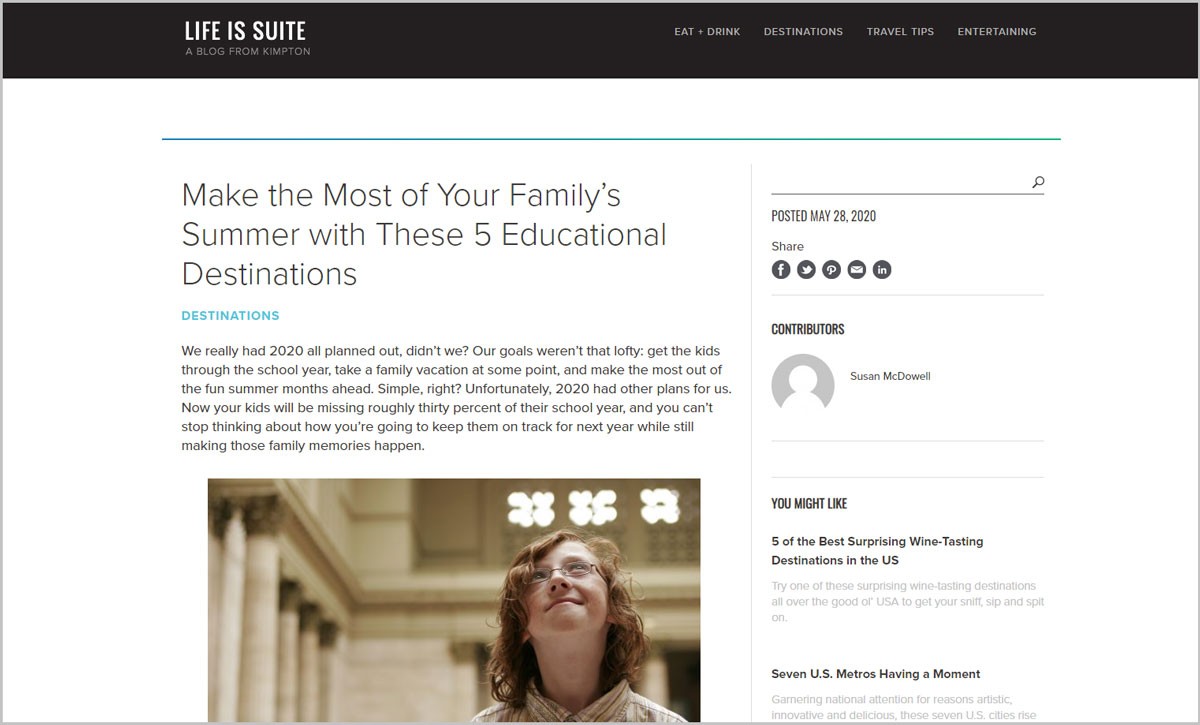
7) Target Event Audiences:
Does your local market have an event season crammed with activities? Highlight them. For that matter, are there always events of one kind that seem to slip under the radar? Build up goodwill around your community and connect them with out-of-towners looking for something different to do.
8) Pull Back the Curtain:
Let hotel staff do some of your content or just be a focus of it. Your team members can let readers know what struggles hotels face in the modern economy, how they overcome such obstacles, and the personal achievements of your staff. Your hotel has human faces running the show, even if guests only see the front desk staff on the way in and out.
9) Connect Through Food:
If your hotel has a restaurant or kitchen, find out from current and former guests which particular recipes they loved the most. Even if the only food is from local restaurants, you still have the chance to find out what guests love. If they want to taste it at home, then give them the recipe and cooking instructions through your blog.
10) Write a Packing Guide:
People want to travel, but they might not know how to pack for travel. This is even more true if you’re in a different region or part of the world than they’re used to. Give them a packing list they can follow so they know what to bring with them when they visit your hotel. Even better, include what they don’t need. This makes life easier for them in vacation preparation. They also save money in not having to pay a premium for anything they forgot while on the road, and they can save even more money by not over packing and wasting money on luggage fees if flying. Ideas like these strike a chord with most travelers and can be some of your most useful content. Here is an example of a packing list on a hotel blog:
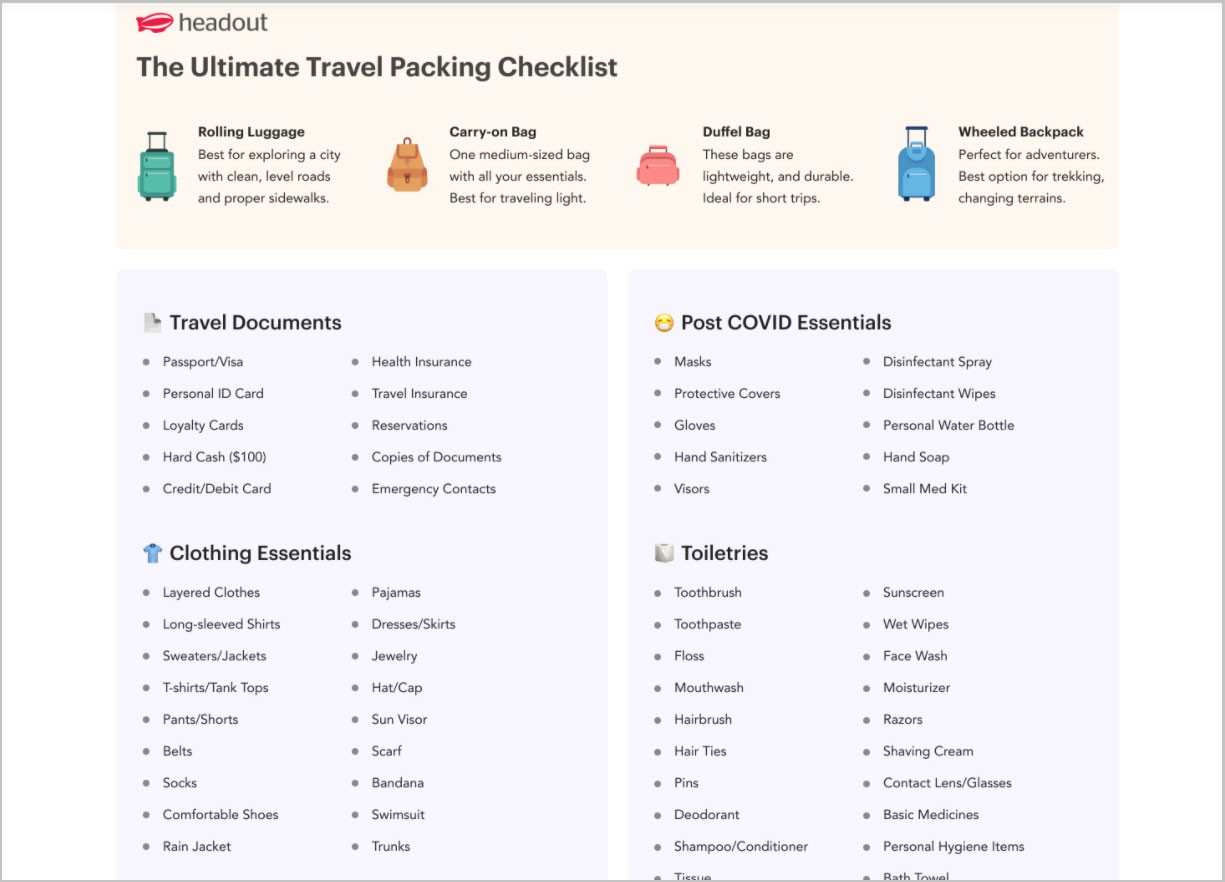
11) Everyone Is on a Budget:
Even if you’re a high-end boutique that caters to the affluent, many of them are probably still conscious about how much they spend. It’s how many are able to become wealthy or at least maintain it. Any content about saving money or having a good time in your area on a budget is likely to be a hit.
12) The 14 Weirdest Requests Our Guests Have Ever Made:
Every hotel will say how they go the distance for guests. How many times do your own staff tell guests that if they need anything they just have to ask? Talk to your staff about the strangest or oddest requests they’ve ever gotten. Better yet, talk to the guests that made the requests and let them tell their stories.
Diib®: Get Your Hotel Blog Started Today!
If you were deliberately looking for content like this, then you probably knew already that you needed ideas and keyword advice about your hotel blog. Now that you’ve read it, hopefully, you feel like you are set. Diib Digital can give you the necessary tools for perfecting your blog and amplifying your traffic. Here are some of the features of our User Dashboard we’re sure you’ll love:
- Keyword, backlink, and indexing monitoring and tracking tools
- Google Core Algorithm monitoring
- Blog campaign monitoring
- Alerts to broken pages where you have backlinks (404 checker)
- Alerts and Objective that guide you to strengthen your website
- Monthly call with a growth expert
Click here for your free 60 second site analysis and industry ranking or call 800-303-3510 to speak with one of our Growth Experts.




Laloon Luxury Suites says:
Laloon Luxury Suites embodies elegance and sophistication in every aspect. From the opulent decor to the impeccable service, it’s a true haven for those seeking unparalleled luxury. Your attention to detail and commitment to excellence truly sets a standard in the hospitality industry. Keep shining!